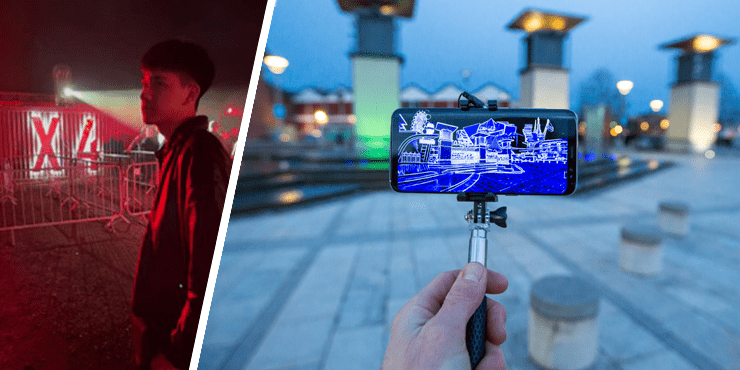The reality of an MSc in immersive technologies
Step into the captivating world of immersive technologies through the eyes of Jiawei Guo, a recent graduate of the MSc Immersive Technologies (Virtual and Augmented Reality) programme.
Why did I choose this programme?

I studied Computer Science and Technology as an undergraduate and I wanted to further my studies in that area, so choosing the MSc Immersive Technologies was a logical next step.
To support my career development, I was looking for a masters programme that would allow me to learn more cutting-edge technologies and improve my future job prospects. I’d previously worked as a product manager where I was involved in advertising and e-commerce. In my opinion, those fields are already quite mature, and as a newcomer it’s hard to excel when other colleagues have a similar skillset. In contrast, immersive technologies is a relatively new discipline so I hope to be able to establish my own area of expertise and stand out from the crowd.
Industry connections
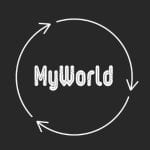 The city of Bristol is home to a thriving creative technologies industry.
The city of Bristol is home to a thriving creative technologies industry.
This particular MSc was designed in collaboration with industry partners to help address skill gaps while connecting organisations to the University’s cutting-edge research. The MSc also has close ties to the MyWorld programme which unites the University of Bristol with 12 other world-leading creative technology partners who operate across academia and industry, including the likes of BBC, BT and Aardman Animations.
When choosing an MSc, I’d recommend considering what the future could hold for the industries you might want to work in. It will give you a broader view than only looking at the short-term situation.
Extended reality (XR) technology encompasses augmented reality (AR), virtual reality (VR) and mixed reality (MR). There’s been a lot of media coverage about the metaverse lately and how XR businesses are offering growing employment opportunities. Although AR glasses, VR headsets, and other immersive hardware equipment are not yet widely used in China for example, when they become popular, XR business will really take off there. There will inevitably be room for further development in the future as more sectors embrace the power of immersive technologies!
The course covers so much!
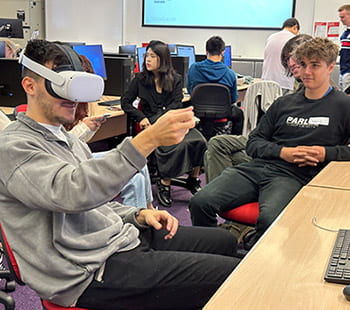
Now to delve into my specific experience of the MSc Immersive Technologies programme. And before that, a quick heads up – course experiences might shift around a bit since the units could change. It’s a good idea to double-check the programme details before you start counting on these specific units being part of your course.
As part of my studies, I undertook the Introduction to Immersive Technologies and Arts unit which covers the core features of XR – immersion. It also gave me an understanding of the breadth of XR technologies and how it can be applied to various sectors. Then, in Virtual Environment Design, I was taught how to use modelling software Maya for 3D model creation, texturing, and rendering.
In the Immersive Interaction and Audio Design unit we covered VR interaction, immersive digital audio, physical principles in VR, and spatialized audio, which unlocked a world of interactive and spatial audio immersive VR applications for me.
Some of our 22/23 MSc lecturers
What impressed me most was the teaching staff. They brought both academic expertise and industrial experience, so the knowledge they pass on is very comprehensive. We mastered the theories but also gained practical skills. In Immersive Games Design, for example, we learnt about game mechanics, level design, and game commercialisation, but we also got to play relevant VR games every week, design our own immersive game, and have engaging discussions in class. It truly achieves the goal of learning through entertainment!
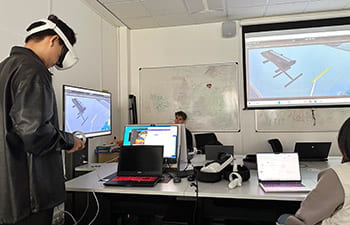
Another example is the Augmenting the Real World unit which includes the theories of AR and a lot of algorithm-related content alongside experimental aspects. We used Unity to develop AR applications, a great way to hone our practical ability!
Computer Science courses at Bristol encourage engineering students to integrate technology with business acumen, so in Innovation and Entrepreneurship, we gained a deeper understanding of market analysis, user analysis, and funding opportunities. Those skills will be really useful if I want to start my own immersive business.
State-of-the-art facilities

During my time at the University of Bristol, I had access to two computer laboratories. One located in the Faculty of Engineering and the other, in the Theatre building. They are equipped with a whole host of immersive technologies including multiple high-spec computers, AR and VR devices, 360-degree cameras and immersive audio equipment. These cutting-edge facilities provide us with ample opportunities for learning and practice. We also get additional support from the teaching technologists.
A cool city experience
You might be wondering what life is like in Bristol. It is truly a very liveable place with a great cultural atmosphere and a young and trendy vibe. The city is famous for its graffiti art and skateboarders can be seen on College Green almost every day.
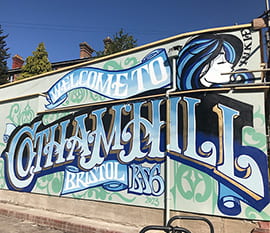
New Graffiti from Inkie on Cotham Hill, near the Clifton campus
There are some good buffet-style restaurants in Bristol too, such as ZAZA and COSMO. I personally recommend COSMO if you’re looking for a wide variety of tasty choices. If you’re into Chinese food, Duoduo Noodles and Shimensi Baofan’s stir-fry dishes will definitely satisfy your needs!
If you’re about to start this MSc, you’ve made a great decision. This programme involves a lot of computer science, but if you don’t have that background you needn’t worry as you’ll be well supported throughout. The friendly teaching staff are there to answer your questions and they take into account student feedback when setting the course content and pace.
By studying at Bristol, you’ll gain a lot of knowledge and practical skills. The MSc in Immersive Technologies gives you a really solid foundation for your future career development!
Related links
*The information and statements contained within this blog is correct at time of publication.


